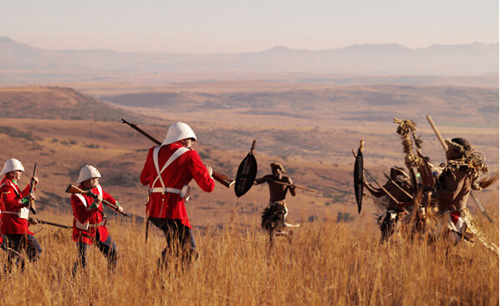|
 |
|
A re-enactment of the Anglo-Zulu battle of January 1879 (COURTESY OF ISANDLWANA.CO.ZA) |
I don't like crowds as a rule, but in the scorching heat of a typical December day in the hills of KwaZulu Natal Province, South Africa, I find myself totally surrounded by thousands of people. Dead people. I can't seem to turn without tripping over another dead or dying, eviscerated, dismembered body. We are standing on the site of the Battle of Isandlwana and the tortured, terrorized screams and death rattles of British soldiers are ear shattering. "I can hear the cries when I do tours here at night in the moonlight. I never see them. I only hear them…" So says our historian guide Rob Gerrard ominously when I ask him if he has ever seen their ghosts in the fourteen years that he's been telling the story of the battle to mesmerized audiences.
The drama that unfolded here on the January 22, 1879 in the undulating hills of the KwaZulu Natal midlands is the stuff of epic, salient legend. And it was all the fault of the egregious Lord Chelmsford who led the regiment. He extended his line of march in enemy country, split his forces and failed to coordinate them in the slightest degree.
Greatest defeat
It was the greatest defeat suffered by the British Army during the Victorian era. A Zulu army of 24,000 warriors (Zulu's are the largest ethnic group in South Africa) had moved undetected to within striking distance of the British camp in the shadow of Isandlwana Mountain. From the start, the 1,700 British, colonial and native troops defending the camp underestimated the danger descending upon them. They were swept aside with horrifying speed and the final stage of the battle consisted of desperate hand-to-hand combat amid the British camp. Over 1,300 men were killed; scarcely 60 Europeans survived.
Isandlwana Lodge is situated in the very heart of this historic location where these remarkable events took place. Rob Gerrard, author, Fellow of the Royal Geographical Society and ex-Gordon Highlander, is a remarkable battlefields historian. He gives an almost minute-by-minute account of the events of that day and makes the leading characters and their cornucopia of fatal decisions come alive with the fervor of a trained actor. He is a gentleman of yore, conjuring up a time where good manners and enunciating one's words still counted for something. And he is a most splendid raconteur.
After our excursion at Islandwana, we travel to Rourke's Drift. The iconic defense of the mission station, by a small force of British and colonial troops, took place immediately following the Islandwana massacre. It saw a record award of Victoria Crosses, and restored the faith of Victorian Britain in their army.
Luxury lodge
After an exhausting day of battle, we return to the cool relief of the Lodge for a welcome beverage. Isandlwana Lodge has 12 luxury en suite rooms, all beautifully decorated in a mixture of traditional and modern styles. The Lodge is carved into the iNyoni rock formation on top of which the Zulu commanders stood during the battle. The pool is built among the rocks and looking at the view from the water I realize the concept of the "infinity pool" must have originated here. From my bedroom I have a similar unparalleled view stretching out across the plains and hills which infuses me with reverie about battles, wars and the endlessly futile quests of men for invariably fragile and fleeting power…
Later we join barman and local resident, Dalton, upstairs for a pre-dinner drink. He wears a couple of hats; aside from barman he is also the battlefields guide, telling the Zulu side of the tale and in retrospect I'm somewhat regretful that we didn't have time enough to join him on a tour for that side of the story.
The food at the lodge is an epicurean dream; well prepared and presented yet not pretentious. And the service is genuinely warm and friendly. The people here smile broadly and often and they mean it.
We turn in early after an exhausting but totally exhilarating day.
| 